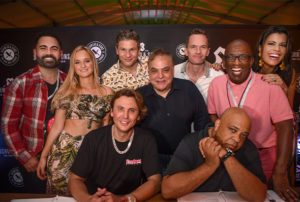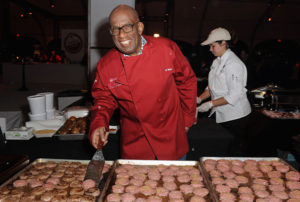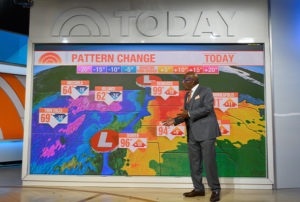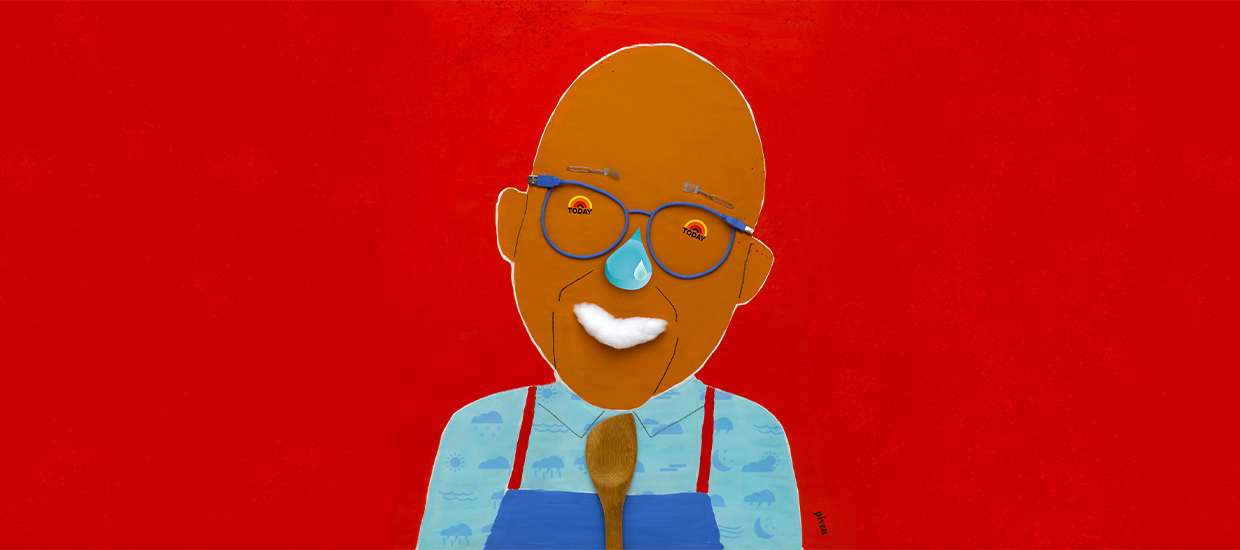The Today star on climate change, race relations, and, crucially, hamburgers
Al Roker still calls himself “a kid from Queens, New York,” and that humble quality is the key to success for the multimedia star the rest of us know as “America’s weatherman.” The 67-year-old started out doing the weekend weather report on local TV in Syracuse, New York, while he was in college in 1974, and eventually made it to NBC News’s Today, where he has been on-air since 1996. In the decades since, his everyman persona—often expressed in segments related to his love of cooking and food—has made him a favorite among viewers.
Roker has made the most of his popularity, thanks to a philosophy he summed up in his 2020 memoir, You Look So Much Better in Person: “Never say no and say yes.” He has written or cowritten 13 books (three of them novels), set the Guinness World Record for longest weather report, appeared in the Broadway production of Waitress, and even maintained the TV news equivalent of a celebrity relationship, namely his 26-year marriage to ABC News correspondent Deborah Roberts. (“We’re a two-network family,” he jokes.)
Roker snuck in a call with Hemispheres during his holiday vacation, just after getting back from the movies with his 19-year-old son, Nick. “I will not give you any spoilers,” he says of Spider-Man: No Way Home, “but it’s worth it.”

As I was preparing for our chat today, I realized you have far more stuff going on—working on Today, writing books, doing podcasts, acting on Broadway— than we could possibly cover in a single conversation. Do you ever sleep?
I do. My goal for the new year is to try to get to bed a little earlier, but I probably get as much sleep as the average person. I go to bed around 9:30 or so, get up around 4.
Among your various scheduled appearances is the South Beach Wine & Food Festival, which takes place in Florida at the end of this month. In particular, you often do the festival’s Burger Bash. What do you like about the event?
The thing I like about the Burger Bash is it’s what you make of it. I’ve judged it, I’ve cooked in it. I tend to do a slider, because people are making these huge burgers, and a lot of it goes to waste. A good slider is a thing of beauty. You can do whatever you want: It’s a small bite, maybe two bites, and then you’re done. I grew up in New York City, and I still am a big fan of White Castle. It’s not a gourmet burger, but as a kid I always liked the slogan, “Buy ’em by the sack” [laughs]. There’s something about the volume of it. There was a bowling alley not too far from the White Castle, and on a Saturday, if you had $5, you were able to bowl a couple of games and still have enough left over to buy a sack of White Castles and a Coke and a bag of fries.
Important question: Do you consider a burger a sandwich?
It is not a sandwich.
You did a series for Today called “Cold Cuts” in which you made sandwiches with various celebrities. What’s your favorite sandwich?
It depends on when you hit me, but I would say my favorite is a grilled cheese and bacon sandwich.
Oh, yeah, in You Look So Much Better in Person you wrote about the ones the NBC commissary used to serve.
Yes. It was in the old commissary, the one that Johnny Carson used to talk about. They had this griddle that was 50 years old and was seasoned beyond belief, and this guy Herman used to make this incredible grilled cheese sandwich with bacon. The only other place that had a grill like that is [Matt’s] in Minneapolis. It’s the home of the Jucy Lucy, a cheeseburger where the cheese is inside the burger, and you bite into it and this molten piece of cheese comes out—my wife is making gagging noises—and it’s got these griddled onions on it. It’s spectacular.

Sounds to me like a good way to burn your tongue.
Yes, you have to be careful, but it’s great. The griddle is the same age as I am, because the restaurant opened in 1954, and they still have the original griddle.
Speaking of classic restaurants, you’ve been doing a streaming show for Today called Family Style with Al Roker, in which you highlight family-owned places such as Russ & Daughters in New York and Faidley’s Seafood in Baltimore. What was the idea behind that?
They all have the same core of family and food, and so many of our favorite memories revolve around sitting around a family table, with your grandmother or aunt or mom or dad or favorite uncle, with a dish that everybody loved. That was the genesis of this series, the idea being families who feed other people.
I think providing a place where people can sit and break bread together is a way to foster connection—which is something America could really use these days.
I interviewed Bishop Michael Curry of the Episcopal Church once, and I said, “How do we bridge this division in our country?” And he said, “Invite somebody that you don’t know to lunch.” While it sounds simplistic, I think it’s true. We fear what we don’t know. That’s always been the case. A lot of times you go into high schools and colleges, you look in the cafeteria, and different groups of kids are not sitting together. The simple act of sitting with somebody who is not from your group can be a game changer. And that’s what food does: It’s that entrée to different people, different cultures, different concepts. That’s the great bridge, I think.
Speaking of bridging gaps, the last couple of years have seen tremendous upheaval around race relations in this country. Have you seen things improve in broadcast news?
One of the things I have seen is that there is more inclusion. There’s more representation. We still have to make big strides for everybody. It’s important that there are places where different voices can be heard. I mean, you look at MSNBC, and you’ve got a wide range of voices, from a Joe Scarborough to a Rachel Maddow to a Reverend Al Sharpton. Different viewpoints, and I think it’s important that we have those. More importantly, the decisionmakers are more diverse. Look at MSNBC: It’s being run right now by a Black woman, Rashida Jones. You look at ABC News, their news president is a Black woman, Kim Godwin. Look at NBC News Group Chairman Cesar Conde, a Latinx person.
You talk about representation—as a Black man who’s on TV, was there a moment when you realized there would be kids who looked up to you as a role model?
I wasn’t conscious of it. I’ve had folks come up to me and say that, and it sort of pushes you back a little bit. You’re like, Wow, I didn’t think of that. I guess when you’re in the middle of something you’re not thinking about what it is you’re doing. I always remember, my dad was a bus driver for a long time, then worked his way into management at the [New York City] Transit Authority. He passed away 20 years ago, and at one of his memorial services, a guy got up and said, “There’s a whole layer of African American middle managers at the Transit Authority who wouldn’t be there if it wasn’t for Al Roker Sr. He mentored us, he taught us, he helped us.” It never dawned on me that my dad did that—I don’t think it dawned on him—but there it was.
That shows you don’t have to be famous or on TV to be an example for other people.
Exactly. The moral there is that no matter what you do or who you are, you can effect change. You can have an impact on somebody’s life.
Do you feel that America as a whole is progressing?
I was privileged to do the last interview with [Congressman] John Lewis, and he was still optimistic. There are going to be setbacks, there are going to be things that don’t go the way you want them to, but you keep moving forward. As long as there’s forward movement, and you’re not giving up, then I think you’re gonna be OK.

You also lead Today Climate’s coverage of climate change across all platforms. What are you trying to communicate to viewers?
I think the idea is not to be, The skies are falling, but, There’s an issue with the sky, and here are the steps we can take to try to repair it. Here’s what you can do to help through individual actions, through pressure on your elected officials. And again, we can’t give up. You look at the ozone layer: There was a hole in the ozone. Well, we’ve mitigated that. We’ve all but gotten rid of that issue.
That’s pretty amazing, right?
It’s pretty amazing. It was doom and gloom 20 or 30 years ago. So that’s to say, if we have the wherewithal and the will to do this, we can do it. Can we reverse it? I don’t know. Can we slow it down? I think so. Can we stop it? I don’t know. But that doesn’t mean we shouldn’t take all opportunities to try.
What’s something any individual can do to have a positive impact against climate change?
Do an energy audit on your home. Your local power utility will come in—in most cases for nothing—and do an audit on your home and make suggestions. You may think, Oh, replacing my furnace, that’s too expensive, but if you look at the cost over the next 10 years and think, This will pay for itself on the energy savings, that’s something. Or any number of smaller things. If you’re close enough, walking or biking to work. That’s not feasible for everybody, but for enough people it is. Or mass transit. All these different things are little things but make a big difference. Look, it’s no secret I love meat, but I’ve been trying to add more plant-based meals to our menu.
Beef does a real number on the environment.
Yeah, and I know it, so I am trying to pull back on that.
Let’s end on a happy note: Today celebrated its 70th anniversary last month. What does that mean to you?
It really is kind of mind-boggling that there’s been a television program that has been on for 70 years. I think most people don’t even think of it as a groundbreaking television show, but at that time there was nothing on TV [in the morning]. TV stations were barely on. The idea of doing a news broadcast in the morning was revolutionary, and now it’s one of those things that you take for granted. To be part of that is pretty amazing.
And you’ve been part of it for more than 25 years.
Yeah, all of a sudden the show doesn’t seem that impressive anymore [laughs].
Al Roker is scheduled to appear at many events at the South Beach Wine & Food Festival (February 24–27), including the annual Burger Bash. For more information, visit sobewff.org.
